|
A Touch of Zen
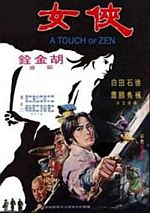
Year of release: 1971
Genre: wuxia
Director: King Hu
Action directors: Han Ying-Chieh, Poon Yiu-Kwan
Producer: Ha Ng Leung-Fong
Writer: King Hu
Cinematography: Wa Wai-Ying
Editors: King Hu, Wong Chun-San
Music: Wu Da-Jiang, Lok Ming-Diy
Stars: Hsu Feng, Shih Jun, Pai Ying, Tien Peng, Cho Kin, Miao Tian, Cheung Bing-Yuk, Sit Hon, Wang Shui, Roy Chiao
Not rated; contains IIB-level violence
Movie review index
Main page
|
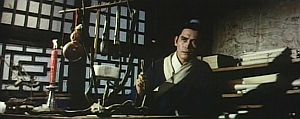 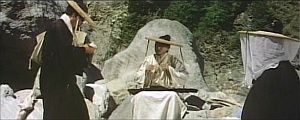
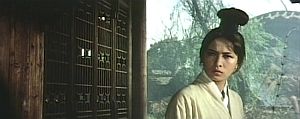 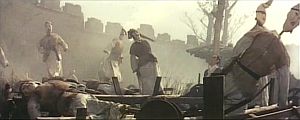
|
Even after almost forty years since its' release, King Hu's wuxia (swordsplay) classic A Touch of Zen remains one of the best martial arts films ever created. It might come off as slow-moving to today's audiences, but even the most jaded viewer should be able to see the power and beauty of this movie's images.
A Touch of Zen takes place in a small town, where Ku (Shih Jun), a lazy and unmarried scholar, becomes smitten with Yang (Hsu Feng). As their romance blossoms, Ku finds out that Yang is a fugitive from the emperor's top adviser, who wants to silence her before she can reveal his corruption. Shedding his mousy exterior, Ku offers his services to devise strategy in order for the couple (along with a small group of loyalists) to take out the troops sent to kill them.
It is generally agreed that A Touch of Zen is a milestone in Asian film-making, with it being the first Chinese-language movie to win a prize at the Cannes film festival, and being credited for introducing Chinese martial arts to a worldwide audience. The movie's impact can be seen to this day, from references in newer productions like Crouching Tiger Hidden Dragon and House of Flying Daggers. So the question becomes that if A Touch of Zen has aged well, and you'll find people on both sides of the fence, each with compelling arguments.
For the positives, there is no denying that A Touch of Zen was a huge technical leap in the realm of martial arts film-making. The cinematography and editing featured kinetic movement absent from pictures from the similar period, which were still very much rooted in Chinese opera, and many times came off as filmed versions of stage plays. As for the martial arts, they do feel a bit stilted and overly-staged, but there is still a satisfying undercurrent of energy that gives the action scenes a very nice ebb and flow.
Detractors of the film will usually point first to its' length. At over three hours, it can feel long, even when compared to recent wuxia films, which are usually known for running longer than your average Hong Kong picture. Also, there is an issue of pacing. A Touch of Zen is very much a slow burn, with the introduction of the characters and setting up of the story taking over an hour, with the first action sequence not occurring until almost forty-five minutes in. Finally, some may find fault with the acting. It does come off as a little more naturalistic than other movies from the period, but it is still somewhat wooden and stilted.
Despite its' problems, this reviewer still greatly enjoyed A Touch of Zen. Even with the suspect transfer on the Tai Seng DVD, this is a gorgeous movie to look at which also delivers some solid action. Probably most importantly, after the film is done, you'll most likely be thinking and wondering about what you've just watched -- which is something most movies fail to deliver, instead just leaving you brain-dead.
RATING: 8.5
|
|




